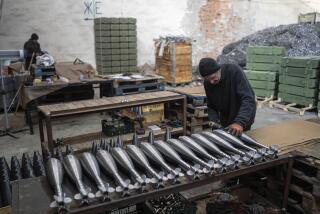It’s the Little Things That Hurt Iraq : Embargo: The U.N. blockade is taking its toll of gaskets, fuses, switches--the nuts and bolts of industry.
- Share via
BAGHDAD, Iraq — Exported oil and imported food, the twin pillars of the Iraqi economy, have been choked by the U.N. trade embargo. But it’s the loss of the little things--gaskets, fuses, switches--that threatens to bring Iraq’s industry to its knees.
Economic analysts predict that the country’s small but vital industrial sector will begin breaking down by the end of the year. A sugar mill and a paper plant have already shut for lack of imported spare parts and foreign engineers, less than two months after the embargo was imposed.
“They cannot produce even the most basic things like nuts and bolts,” a Western diplomat said Friday. “The workers are poorly trained. They can’t get the pitch right on the thread (of a bolt).”
Shortly after Iraq’s Aug. 2 invasion of Kuwait, Swiss engineers walked off their jobs at a power plant in the southern port of Basra. The situation was too dangerous, they said--not the threat of war, but the conditions at the plant.
The Ministry of Industry, which devotes most of its resources to producing weapons and ammunition, has concentrated its best men and machines in the military sector. Consumer products are turned out with second-rate machines purchased from East European countries. “Quasi-reliable,” the diplomat observed.
“Iraq is self-sufficient in very few areas,” Jonathan Crusoe, an analyst with London’s Middle East Economic Digest, said recently. “It is only a matter of time before the lack of parts and raw materials stops production lines.”
The embargo has dried up hard-currency revenues from oil, but this makes little difference because the sanctions prevent Baghdad from importing industrial goods anyway. Food, the most emotional issue of the embargo, is overrated in terms of its impact, diplomats and Iraqi officials say. Iraq has enough to get by, though its propaganda organs continue to complain loudly about the lack of imported dried milk for infants.
According to the analysts, day-to-day domestic commerce will feel the pinch in coming weeks--a combination of parts shortages, ill-trained workers and long-term neglect.
“It’s an economy based on waste,” the Western diplomat said. Even during the 1980-1988 war with Iran, mechanical breakdowns were never properly repaired, he said, adding: “When the fan belt on a truck broke, they would simply replace the engine with one from another truck. Quite an extravagance for want of a fan belt in the supply line.”
As the shortage of spares and competent workers worsens, the disintegration of industry and the broader economy will be cumulative. A missing spare will take out a truck; the sidelined truck will not be able to carry components to a plant; the plant’s assembly line will be shut down by the absence of components.
Iraqis say spare parts are already a problem for the Japanese cars that jam the streets of Baghdad. For the cars that are available, the price is soaring, as it is for parts. Before the embargo, a motorist said, he could buy four new tires for 200 Iraqi dinars. The price now is 400 dinars for two tires.
Industrial fuses also are in short supply. When they fail, technicians attempt repairs by driving a wire through the fuse to carry the current. It doesn’t work.
“The next time it blows, it goes off like a hand grenade,” an analyst remarked. The Iraqi habit of starting generators with a series of auto batteries produces similarly explosive results.
“You could say the Iraqis don’t have a mechanical aptitude,” the Western diplomat said. “Engineers say they can follow the steps in a textbook OK, but they don’t understand the principles involved.”
So far, the infrastructure is holding up, and there have been no power outages. Transport is adequate. But how long can it continue with the supply chain of critical parts blocked by the embargo?
At one factory, a failed regulator was replaced with manpower: A worker was assigned to watch the power level on a gauge and then try to adjust it manually to prevent a surge.
“In this case, the eye was quicker than the hand,” the diplomat said of the failed experiment.
So far, Iraqi officialdom has insisted that the economy can withstand the embargo. One bureaucrat, asked whether the growing shortage of truck and car parts would hamper the military effort, told a reporter: “Remember Vietnam. A little country was able to defeat the Americans without a major transport train.”
The Vietnamese had bicycles, he was reminded. “Well, we can make bicycles too,” he replied.
But they would need both parts and machines. Before the crisis, the manufacturing sector accounted for less than 15% of Iraq’s gross national product, the sum of its goods and services, and it was highly dependent on imports. Requests to the British Department of Trade and Industry included everything from electronic components to steam boilers, integrated circuits and paper bags for cement.
The expertise that kept Iraqi factories running before the Persian Gulf crisis was supplied by thousands of foreign engineers brought in under contract. Many left the country in the first weeks of the crisis; others stayed too long and became “guests” of the Iraqi government. Some of them are still on the job, notably a large group of Soviet technicians.
“I still go in to the project on workdays,” said a British engineer who is trapped without an exit visa and living in a Baghdad flat. “But it’s just killing time. We are getting no materials. It’s something to do, and it’s nothing to do.”
More to Read
Sign up for Essential California
The most important California stories and recommendations in your inbox every morning.
You may occasionally receive promotional content from the Los Angeles Times.













